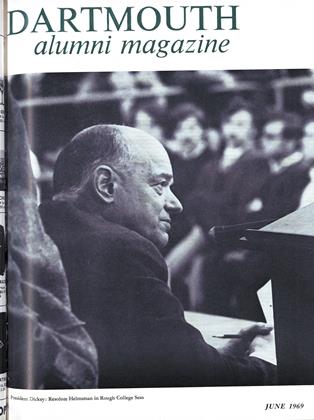PETER IN ROME. THE LITERARY, LITURGICAL, AND ARCHEOLOGICAL EVIDENCE.
JUNE 1969 KATHERINE LEVERBy Daniel Wm. O'Connor'46. New York and London: ColumbiaUniversity Press, 1969. 44 plates. 242 pp.$2O.
The Apostle Peter was a source of controversy in his life, and now, nineteen centuries after his death, people are still asking questions about him. Professor O'Connor has focused his attention on "Peter's presence in Rome, his martyrdom, and his burial." The debate began with "the absence of any direct statement or any allusion to Peter's residence in Rome in the letters of Paul" or in the Book of Acts.
The silence of these primary documents is first interpreted and then all other evidence - literary, liturgical, and archaeological - is thoroughly tested to establish date, authenticity, and bearing on the problems. Faced with late, vague, scanty, and often tangential evidence, Professor O'Connor maintains a remarkably judicious and balanced attitude. He speaks of probabilities rather than certitudes. It is "highly probable that Peter did visit Rome." Persistent tradition makes it seem "most probable" that Peter was crucified in Rome during the persecutions of Nero, 64 to 67. And "it appears more plausible than not" that Peter "was remembered in the traditions of the Church and in the erection of a simple monument near the place where he died," but that his "body was never recovered for burial by the Christian group which later, when relics became of great importance for apologetic reasons, came to believe that what originally had marked the general area of his death also indicated the precise placement of his grave" (p. 209).
A scholar has written for the serious student a book both difficult and easy to read. The difficulty springs from the nature of the evidence and the scholar's meticulous attention to detail; the ease results from the clear directions, frequent signposts, precise divisions into categories, illustrations, and a chronological chart. The footnotes and bibliography open the field for further exploration and application to issues outside the limits defined by the author.
Professor O'Connor's good sense and thoughtful detachment have turned an old controversy into a new quest for all who seek the truth about the Apostle Peter. As the author says, the Roman Catholic Church is not the issue. Her foundations will not be rocked even if anyone does prove that Peter was never in Rome. Sectarian polemics need to give way to the critical and scientific examination of a tradition so that everyone - regardless of creed - can travel the difficult road to life and death in first-century Rome.
A classical scholar with an interest in churchhistory and the daughter of a clergyman,Miss Lever is Professor of English, Wellesley College.
 View Full Issue
View Full Issue
More From This Issue
-
 Feature
FeatureEight Graduates of Dartmouth Who Were First College Presidents
June 1969 By John Hurd '21 -
 Feature
FeatureTwelve Hours and Their Aftermath: The Student Seizure of Parkhurst Hall
June 1969 By C.E.W. -
 Feature
FeatureThe Class Officers Weekend
June 1969 -
 Feature
FeatureFOUR PROFESSORS WHO ARE RETIRING
June 1969 -
 Feature
FeatureBicentennial Year Begins June 14
June 1969 -
 Article
ArticleAlumni Awards
June 1969
KATHERINE LEVER
-
 Books
BooksTHE ODYSSEY OF HOMER.
FEBRUARY 1968 By KATHERINE LEVER -
 Books
BooksAMERICAN WOMEN: A STORY Of SOCIAL CHANGE.
OCTOBER 1970 By Katherine Lever -
 Books
BooksTHE AMERICAN PRINCESS.
OCTOBER 1971 By KATHERINE LEVER -
 Books
BooksKAZANTZAKIS AND THE LINGUISTIC REVOL UTION IN GREEK LITERATURE.
JUNE 1973 By KATHERINE LEVER -
 Books
BooksTHE NOVELS OF JANE AUSTEN: AN INTERPRETATION.
March 1974 By KATHERINE LEVER -
 Books
BooksEURIPIDES: IPHIGENEIA IN TAURIS.
February 1975 By KATHERINE LEVER
Books
-
 Books
BooksREFLECTIONS ON THE HUMAN VENTURE.
July 1960 By ALBERT H. HASTORF -
 Books
BooksCAVE DRAWINGS FOR THE FUTURE.
June 1954 By CHURCHILL P. LATHROP -
 Books
BooksVOICES IN COURT – A TREASURY OF THE LAW.
JANUARY 1959 By DONALD L. STONE -
 Books
BooksEXPECTANT PEOPLES.
OCTOBER 1964 By FRANK R. SAFFORD -
 Books
BooksKEATS'S METAPHORS FOR THE POETIC IMAGINATION.
NOVEMBER 1967 By JAMES A.W. HEFFERNAN -
 Books
BooksKHANS AND SHAHS: A DOCUMENTARY ANALYSIS OF THE BAKHTIYARI IN IRAN
SEPTEMBER 1985 By Mark Woodward '72

